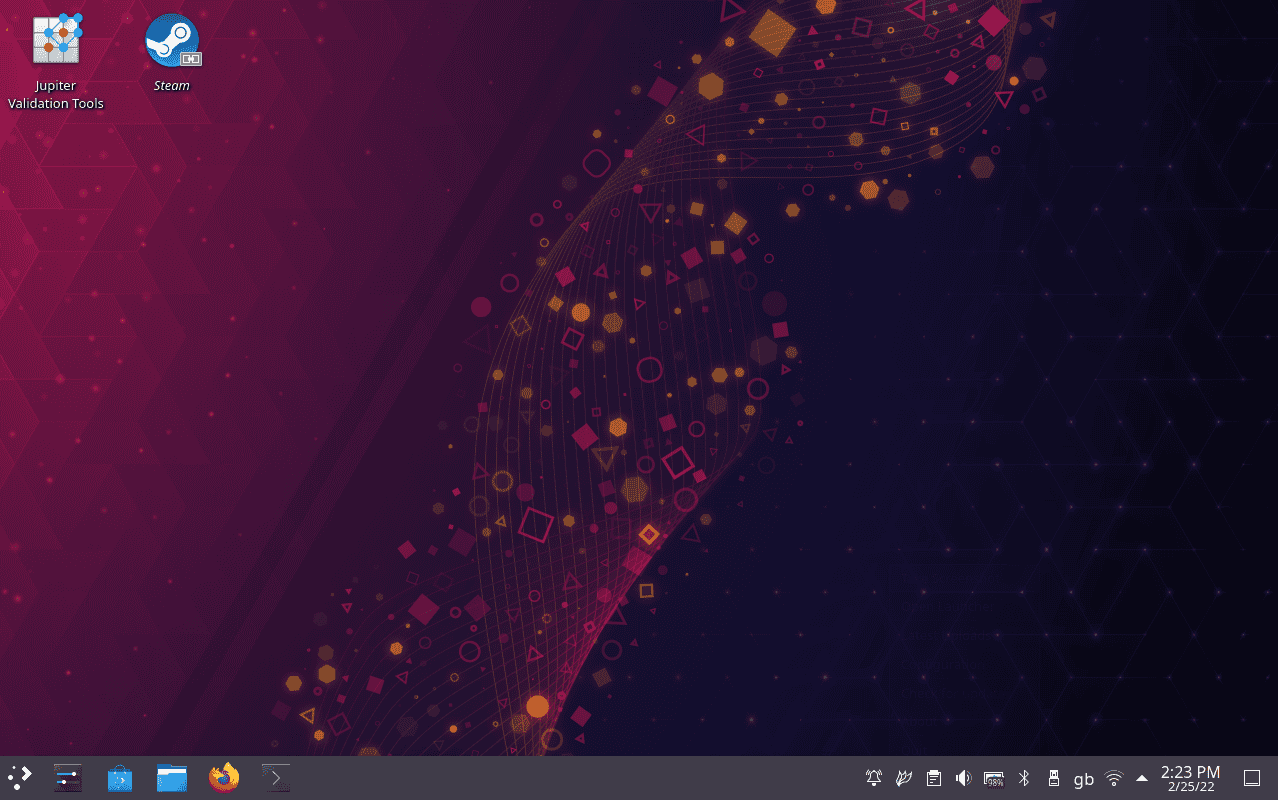Valve has announced significant developments with SteamOS, expanding its platform beyond the Steam Deck, raising concerns for Bazzite, a prominent Linux gaming OS. The support from Valve is making it easier to play PC games on Linux, leading to more choices for gamers.
Advancements in compatibility layers like Proton and the success of the Steam Deck have encouraged more developers to consider Linux support for their games, indicating a growing and evolving Linux gaming landscape.
Image: Liam Dawe/GamingOnLinux, CC BY-SA 4.0 https://creativecommons.org/licenses/by-sa/4.0, via Wikimedia Commons
The Future of Bazzite and SteamOS
What is Bazzite?
Bazzite is a Linux-based operating system. It’s built on Fedora Linux. It aims to give users a Steam Deck-like experience on regular PCs and other handheld devices. It uses some parts of SteamOS, the operating system that runs the Steam Deck. This lets users play PC games with a controller-friendly interface, similar to the Steam Deck.
SteamOS Expansion: A Potential Threat to Bazzite?
Valve, the company behind Steam and SteamOS, might be expanding SteamOS to work on more devices. This could cause problems for Bazzite. If Valve offers official support for more hardware, fewer people may need Bazzite. They might choose the official, supported version of SteamOS instead.
Bazzite’s Strengths
Even with SteamOS expanding, Bazzite has some things going for it:
- Hardware Support: Bazzite works on many different kinds of computers. If SteamOS only supports a few devices, Bazzite will still be useful for people with other hardware.
- Community and Customization: Bazzite is built by a community of developers. This means it can be changed and customized more easily than SteamOS. Some users may like this extra control.
Challenges for Bazzite
Bazzite faces some challenges:
- Keeping Up with SteamOS: As Valve updates SteamOS, Bazzite developers must work to keep their system compatible. This takes time and effort.
- Resources: Bazzite is a community project. It may not have the same resources as Valve, a large company. This could make it hard to keep up with SteamOS updates.
Comparing Bazzite and SteamOS
| Feature | Bazzite | SteamOS |
|---|---|---|
| Base | Fedora Linux | Arch Linux |
| Hardware Support | Wide range of PCs and handhelds | Initially Steam Deck; expanding |
| Development | Community-driven | Valve-developed |
| Customization | High | Lower |
What Does This Mean for Users?
If you want a Steam Deck-like experience on a PC or other device, Bazzite is a good option now. But keep an eye on Valve’s plans for SteamOS. If they support your hardware, the official SteamOS may be a better choice in the future. It will likely have better support and updates.
Gaming on Linux: Other Options
Besides Bazzite and SteamOS, other options exist for PC gaming on Linux. Popular Linux distributions like Pop!_OS and Ubuntu offer good gaming support. They include tools and drivers that make it easy to play games. These are good if you want a general-purpose operating system that can also play games.
Another option is using Wine or Proton. These tools let you run Windows games on Linux. Proton is built into Steam and makes many Windows games playable on Linux without much setup. This gives Linux users access to a large library of games.
Short Summary:
- Valve expands SteamOS to other handheld devices, indicating a shift in its gaming ecosystem.
- Bazzite, a popular Linux OS for gaming, faces uncertainty following Valve’s announcements.
- Citing the open-source nature of Bazzite, its creator reassures users that the platform will continue to thrive alongside SteamOS.
Valve has recently invigorated the gaming community with its announcement that SteamOS, its customized Linux-based operating system tailored for gaming, is expanding beyond its flagship handheld, the Steam Deck. During Lenovo’s recent unveiling of the Legion Go S, a gaming handheld powered by SteamOS, Valve made it clear that they’re serious about integrating their platform into a wider range of devices. This evolution, however, invites a critical question: What does this mean for Bazzite, the rising star in the Linux gaming operating system landscape?
Bazzite has earned its reputation as a ‘Linux darling’ among the handheld gaming community. It deftly marries various Linux distributions and enhancements—including Fedora, and Nobara, which integrates performance-oriented tweaks—creating a fluid experience for gamers on devices like GPD and OneXPlayer. It has garnered accolades from major tech outlets such as The Verge, Ars Technica, and Eurogamer, establishing itself as a formidable competitor in the gaming sphere. Popular YouTube channels, including Linus Tech Tips and Digital Foundry, have showcased Bazzite’s sleek interface and exceptional performance, often compared favorably to SteamOS on various devices.
Despite this traction, the recent announcements from Valve have sparked anxiety about Bazzite’s future. Kyle Gospodnetich, the creator of Bazzite, addressed these concerns through a public service announcement (PSA), reassuring users that Bazzite would persist and serve a vital role in the evolving landscape of gaming-focused Linux distributions.
“The Bazzite team is extremely excited for the upcoming expanded launch of Steam OS. Obviously, none of us would be here if not for Valve lighting the way. That being said, we strongly believe Bazzite has a continued role to fill in a post-Steam OS future,” Gospodnetich remarked.
His statement is significant, especially considering Valve’s often slow-paced approach to software evolution. Many doubt the company will streamline support for the diverse range of gaming handhelds in the market, especially with Bazzite already supporting many obscure models. Gospodnetich further noted,
“Bazzite was born out of supporting users with Steam OS in the Steam Deck Discord, and is designed to make up for some of the shortcomings of Steam OS, such as immutability preventing package installs when needed, lack of printing, lack of secure boot, and lack of drive encryption.”
Indeed, users have reported that SteamOS’s immutability can frustrate those looking to customize their experience, as it often restricts package installations and other functionalities that are straightforward on Bazzite. For power users seeking flexibility, Bazzite offers an attractive alternative – often perceived as a ‘modded’ version of SteamOS but with enhanced options and more robust functionality.
Furthermore, the impact of Bazzite extends beyond its immediate user base. It has arguably helped drive demand for SteamOS channels beyond handhelds, showcasing a depth of performance that entices the community for other devices like the ROG Ally and Legion Go. With this foundation, Bazzite not only sustains its audience but inspires the hope of growing interest in expanded usability within the gaming realm.
Amidst these developments, Valve continues its ambitious vision for SteamOS. The company has indicated it will issue a beta version of SteamOS that aims to improve compatibility and user experience across a range of handheld devices. The beta will be made available ahead of the official Legion Go S shipping, allowing early adopters to trial the new functionalities.
Valve’s commitment to community involvement is evident as they encourage users to download and test the beta themselves, continually adding support and refining user experience with future updates.
This willingness to engage with users reflects a broader pattern of Valve’s strategy, aiming to foster a robust ecosystem while enticing gamers to make the switch from traditional OS platforms like Windows. SteamOS boasts a seamless interface, quick system updates, and out-of-the-box functionality for thousands of games, particularly when it comes to optimizing performance across the hardware dedicated to gaming.
While the narrative surrounding SteamOS and Bazzite unfolds, there remains an intricate interplay between these competing systems, each catering to different segments of the gaming audience. For many competitive users, lingering issues such as limited support for certain anti-cheat systems on Linux stand as a barrier to ultimate adoption. Games like League of Legends and Fortnite still tether their player bases to Windows due to stringent anti-cheat protocols that currently lack Linux support.
Yet, as Valve continues to embrace the open-source community and promote its SteamOS, shifting the narrative around Linux gaming remains essential. A promising future for SteamOS might mean even greater traction for Linux as communities unite to champion gaming freedom and choices devoid of proprietary constraints.
As SteamOS continues to unfurl its offerings to more handheld devices, it remains equally critical for users to evaluate their choices – assessing whether the convenience of a user-friendly UI like that offered by Bazzite or SteamOS enhances their gaming experience. The upcoming beta release and future improvements promise to bolster the Steam gaming ecosystem, leaving many wondering whether these advancements could entice even more gamers to embrace SteamOS and Linux in general.
Thus, while Bazzite finds itself in a pivotal moment, Gospodnetich’s reassurances carry weight. The community holds a space for continued growth and innovation amidst the rising tide of corporate SteamOS, with Bazzite remaining not merely a “clone” of SteamOS but a testament to the power of open-source development and user-driven enhancements. As we look forward to the changes on the horizon, the narrative thread of gaming continues, unveiling new stories of technology, community, and adventure in handheld and desktop gaming.







